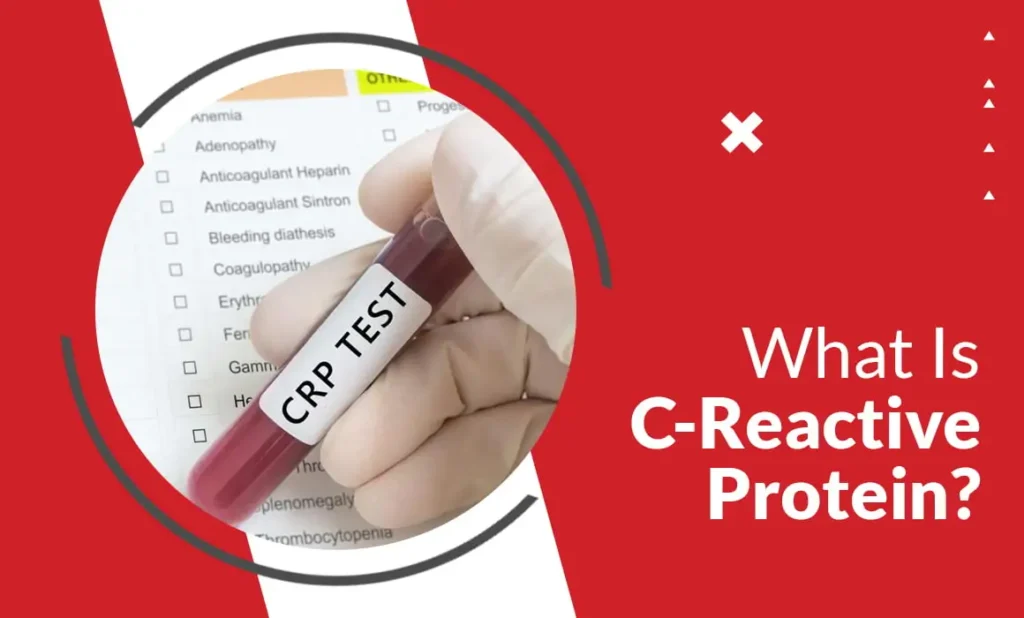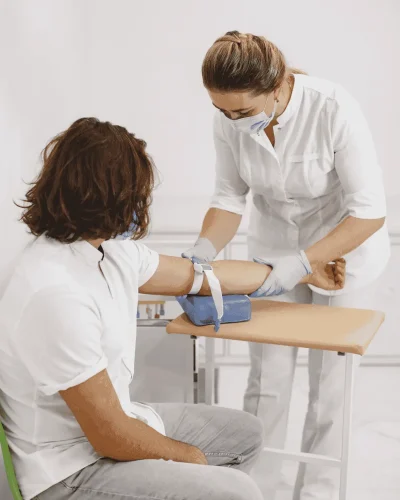
CRP Home Blood Lab Tests in Dubai
C-reactive protein (CRP) is a substance produced by the liver in response to inflammation. Measuring the levels of CRP in the blood can help detect inflammation and monitor treatment for inflammatory conditions.The C-Reactive Protein (CRP) Test is an essential diagnostic tool that measures the levels of C-reactive protein in the bloodstream. This protein is a marker of inflammation, providing critical insights into the body’s response to various conditions. It helps healthcare professionals assess overall health and identify potential issues.
What is a C-Reactive Protein (CRP) Test? A CRP test measures the amount of C-reactive protein in your blood. High levels of CRP can indicate inflammation in the body, which may be due to a variety of conditions, including infections, chronic diseases, and acute injuries.

- Lab test/Blood test at home services in Dubai
- Lab test service to you in the privacy, safety, and comfort of your own space
- Sevice is available the 24x7 whole Emirates of Dubai
- DHA Approved labs and well trained collection experts
- Sample collected from your Home/Hotels
- Fast and accurate Results
- All types of Lab tests are available
- Results will send to you digitally.
- Lab test at home from Medilife - Save your time and efforts for lab visits.
Book Home Blood Lab Tests in Easy Steps
Make a Call
Make a call to our number, Check the slot availability
Share Your Location
Share your google location if its in Home/Office/Hotel
Sample Collection
Our medical team will reach you as scheduled for the sample collection and share your results online
Lab / Blood Test Packages
Comprehensive Health Check
- Sugar-F
- CBC+ ESR
- HbA1c
- LFT
- KFT
- Lipid Profile
- Thyroid Profile
- Iron Studies
- Vit. D
- Vit.B12
- Urine R/M

Get an Appointment For a Home Blood Lab Tests for Pregnancy in Dubai
Why is a CRP Test Done?
CRP tests are ordered for several reasons, including:
Detecting Inflammation: To identify and evaluate inflammation in the body.
Monitoring Chronic Conditions: To monitor diseases such as rheumatoid arthritis, lupus, and inflammatory bowel disease.
Assessing Infection: To detect bacterial infections and monitor the effectiveness of treatment.
Evaluating Heart Disease Risk: High-sensitivity CRP (hs-CRP) tests are used to assess the risk of cardiovascular diseases, as inflammation is a contributing factor.
- Covid 19 Test
- Anaemia Test
- Blood Sugar Test
- Complete Blood Count
- Cholesterol Test
- Diabetes Test
- Electrolytes
- Microbial Culture & Sensitivity Test
- CRP
- Food Intolerance Test
- Lipid profile test
- Mineral Test
- Pregnancy Test
- Renal Function Test
- Stool Test
- Urine Test
- Sexual Health Test
- Semen Test
- Testosterone Test
- Infertility Test
- Hormone Test
- Thyroid test
- HbA1C Test
- Kidney Function Test
- Allergy Test
- Food Sensitivity Test
- Hepatitis B
- Hepatitis A
- Influenza Test
- Lipid Profile
- Vitamins Test
- Liver Function Test
- Antibody test
Special Blood Checkup Package
Home Blood Lab Tests Starting from- Total 10 Panel Tests
- RFT (Kidney Profile), LFT(Liver Profile Test)
- CBC, HBA1C, Glucose FBS/RBS
- LIpid Profile (Cholesterol, Triglycerides, HDL, Direct LDL, VLDL, Calculated, Total HDL Ratio)
- At Home sample Collection
- DHA Approved Staffs
- Fast and Hassel Free
- 24x7 Service Across Dubai
Why to Choose Medilife for Home Blood Lab Tests
Medilife Healthcare Services has never deviated from providing you with the premium quality services at your convenience. We provide a wide range of services that are available to everyone at any time. Medilife Healthcare Services is well-known for offering the greatest home healthcare services, including at-home lab tests in Dubai.
Assurance of Quality
100% accurate results and sample collection at your doorstep
Affordable Pricing
We offer premium quality tests and health services at affordable price ranges
Efficient Testing, Faster Results
We understand your needs, The reports delivered to you in the quickest possible time
Experienced Clinical Team
Experienced team of experts and labs are approved by Dubai Health Authority
Related Laboratory Testing & Medical Diagnostic Services
PCR test at Home
Express fast PCR test swab collection within an hour in the safety of your home or hotel in Dubai. The PCR test results time is as low as 4 to 5 hours ONLY.
Influenza (flu) Vaccine
Influenza vaccine cost is reasonable but home care vaccination services ensure that you get a quality effective vaccine in the safety of your home.
IV fluids services
Get 100% efficient IV fluids at home in Dubai, UAE. Book at home IV fluids service for dehydration by licensed & trained infusion nurses.
HIV test at home
100% Confidential HIV test at home in Dubai. There are 3 different types of HIV testing available: Nucleic Acid Tests (NAT), antigen/antibody tests, and antibody tests.
Book CRP Blood Tests Appointment NOW!

What is a CRP test?
A CRP test measures the level of C-reactive protein in the blood, which is a marker of inflammation in the body.
How is the CRP test performed?
A blood sample is drawn from a vein in your arm and sent to a lab for analysis.
What are normal CRP levels?
Normal CRP levels are typically less than 10 mg/L, though ranges can vary based on the lab and individual factors.
What does a high CRP level mean?
Elevated CRP levels indicate inflammation, which can be due to infections, chronic diseases, or increased cardiovascular risk.
How long does it take to get CRP test results?
Results are usually available within one to two days.
Can CRP levels be affected by other factors?
Yes, factors such as smoking, obesity, and even minor infections can elevate CRP levels.
What is the difference between a standard CRP test and a high-sensitivity CRP (hs-CRP) test?
The hs-CRP test is more sensitive and can detect lower levels of inflammation, useful for assessing heart disease risk.
Are there any risks associated with a CRP test?
The risks are minimal, similar to any blood test, such as slight bruising or tenderness at the needle site.
What conditions can cause elevated CRP levels?
Conditions like bacterial and viral infections, autoimmune diseases, chronic inflammatory diseases, and cardiovascular diseases can cause elevated CRP levels.
Can diet and lifestyle changes affect CRP levels?
Yes, a healthy diet, regular exercise, and avoiding smoking can help reduce CRP levels and overall inflammation.
Is the CRP test used to diagnose specific diseases?
While it is not used to diagnose specific diseases, it helps in identifying the presence and severity of inflammation in the body.
What is the high-sensitivity CRP (hs-CRP) test specifically used for?
The hs-CRP test is used to assess the risk of cardiovascular diseases by detecting lower levels of inflammation.
Can medications affect CRP levels?
Yes, certain medications like statins and anti-inflammatory drugs can lower CRP levels.
How often should a CRP test be done?
The frequency depends on the individual's health condition and the doctor's recommendations, typically as part of ongoing monitoring for chronic conditions.
What other tests might be done along with a CRP test?
Other tests like the ESR (erythrocyte sedimentation rate) and various imaging tests might be done to further investigate the cause of inflammation.
Are there any symptoms associated with high CRP levels?
High CRP levels themselves do not cause symptoms but indicate an underlying condition that might have its own symptoms.
How is the CRP test result interpreted?
CRP levels are interpreted by healthcare providers in the context of the patient’s overall health and other diagnostic tests to determine the cause and significance of the inflammation.
How is a CRP Test Performed?
A CRP test is a simple blood test. Here’s how it’s done:
- Preparation: No special preparation is needed. However, inform your doctor of any medications you are taking as some can affect CRP levels.
- Blood Sample: A healthcare professional will draw a blood sample from a vein in your arm.
- Lab Analysis: The blood sample is sent to a laboratory for analysis.
- Results: Your doctor will receive the results and discuss them with you.
Interpreting CRP Test Results
CRP levels are measured in milligrams per liter (mg/L). Here’s what different levels might indicate:
- Low CRP (less than 1 mg/L): Low risk of inflammation or cardiovascular disease.
- Moderate CRP (1-3 mg/L): Moderate risk of inflammation or cardiovascular disease.
- High CRP (greater than 3 mg/L): High risk of inflammation, infection, or cardiovascular disease.
Note: Very high levels of CRP (above 10 mg/L) often indicate significant inflammation due to acute infections or chronic inflammatory conditions.
Conditions Associated with High CRP Levels
High CRP levels can be associated with various conditions, including:
- Infections: Bacterial and viral infections.
- Chronic Inflammatory Diseases: Rheumatoid arthritis, lupus, and inflammatory bowel disease.
- Heart Disease: Increased risk of heart attacks and strokes.
- Other Conditions: Cancer, obesity, and metabolic syndrome.
Limitations of CRP Testing
While CRP testing is useful, it has limitations:
- Non-Specific: Elevated CRP levels indicate inflammation but do not pinpoint the exact cause.
- False Positives: Certain factors, such as smoking, obesity, and physical inactivity, can elevate CRP levels.
- Complementary Tests: CRP tests are often used alongside other tests and clinical evaluations to diagnose and monitor conditions.
Conclusion
A C-reactive protein (CRP) test is a valuable tool in detecting and monitoring inflammation in the body. It helps healthcare providers diagnose infections, chronic inflammatory diseases, and assess the risk of cardiovascular diseases. If your doctor recommends a CRP test, it’s an essential step in understanding and managing your health.
The C-reactive protein (CRP) blood test is a significant diagnostic tool used to detect inflammation in the body. Here’s an in-depth look at CRP, its normal ranges, implications of high levels, and related keywords.
What is a C-Reactive Protein (CRP) Blood Test?
A CRP blood test measures the amount of C-reactive protein in your blood. CRP is produced by the liver in response to inflammation, and its levels increase when there is inflammation in the body.
Why is a CRP Test Important?
The CRP test is crucial for identifying and monitoring inflammation, which can be due to infections, chronic diseases, or acute injuries. It helps in diagnosing conditions and assessing the effectiveness of treatments.
CRP Blood Test and Normal Range
- CRP Blood Test: This test involves drawing a blood sample to measure CRP levels.
- Normal Range: The normal range for CRP is typically less than 1 milligram per liter (mg/L).
Interpreting CRP Levels
- CRP Blood Work: Results from a CRP blood test are used to assess inflammation levels.
- Blood Analysis CRP: A detailed analysis of CRP levels helps in understanding the underlying health condition.
- CRP Value Normal Range: Generally, a CRP level less than 1 mg/L is considered low risk, 1-3 mg/L is moderate risk, and above 3 mg/L is high risk for inflammation or cardiovascular diseases.
High CRP Levels and Their Significance
- C Reactive Protein is High Means: Elevated CRP levels indicate significant inflammation, which can be due to various causes.
- Elevated CRP Levels: High CRP levels can be associated with infections, chronic inflammatory diseases like rheumatoid arthritis or lupus, and increased risk of heart disease.
- High C Reactive Protein Meaning: Persistent high CRP levels may suggest an ongoing inflammatory process that needs medical attention.
- Significance of Elevated CRP: It highlights potential health issues that require further investigation and management.
Understanding CRP Test Results
- CRP Test Means: This test indicates the level of inflammation in the body.
- CRP Blood Test Meaning: It provides insights into the presence and severity of inflammation.
- CRP Test Positive Means: A positive CRP test signifies elevated CRP levels, indicating inflammation.
- Blood Report CRP Means: Your blood report showing CRP levels helps diagnose and monitor inflammatory conditions.
Other Relevant Information
- C Reactive Protein Low: Low CRP levels generally indicate no significant inflammation.
- CRP Blood Check: Regular CRP checks are essential for individuals with chronic inflammatory conditions.
- CRP Blood Test and Its Use: It is widely used to monitor conditions like infections, chronic inflammatory diseases, and cardiovascular risk.
- Blood Analysis CRP: A comprehensive blood analysis includes measuring CRP to evaluate overall health.
- CRP Value Normal Range: Keeping CRP within the normal range is crucial for preventing inflammatory diseases.
Conclusion
The CRP blood test is a valuable diagnostic tool for detecting and monitoring inflammation in the body. Understanding your CRP levels can help in early detection and effective management of various health conditions. If your CRP levels are high, it’s essential to consult with your healthcare provider to determine the cause and appropriate treatment. Regular monitoring and a healthy lifestyle can help maintain normal CRP levels and reduce the risk of inflammation-related diseases.
Purpose: Illuminating Inflammatory Response
The CRP Test primarily aims to measure CRP levels for various diagnostic purposes:
- Inflammation Detection: Identifies both acute and chronic inflammation.
- Infection Monitoring: Evaluates the severity and progression of infections.
- Cardiovascular Risk Assessment: Assesses the risk of heart diseases linked to chronic inflammation.
- Autoimmune Disease Evaluation: Supports the diagnosis and management of autoimmune conditions.
Indications: When is the CRP Test Recommended?
CRP testing is recommended for:
- Inflammatory Conditions: Diagnosing or monitoring conditions like arthritis or inflammatory bowel disease.
- Infections: Evaluating the inflammatory response to bacterial or viral infections.
- Cardiovascular Risk Assessment: Assessing the risk of heart diseases.
- Autoimmune Diseases: Monitoring conditions such as lupus or rheumatoid arthritis.
Procedure: What to Expect During a CRP Test
The CRP test involves a straightforward process:
- Blood Sample Collection: A blood sample is drawn from a vein in the arm.
- Laboratory Analysis: The sample is analyzed to measure CRP levels accurately.
- High-Sensitivity CRP (hs-CRP) Test: In some cases, a more sensitive test is performed to detect lower levels of CRP associated with cardiovascular risk.
- Results Reporting: Results are reported in milligrams per liter (mg/L), indicating the CRP concentration in the blood.
Normal Range: Understanding CRP Levels
CRP levels can vary based on factors like age, sex, and health conditions. Generally, levels below 10 mg/L are considered within the normal range.
Conclusion: Proactive Health Management Through CRP Insights
The CRP Test is crucial for assessing inflammation and guiding healthcare decisions. By measuring CRP levels, this test aids in diagnosing and managing a variety of conditions. Regular CRP testing enables individuals to take proactive steps towards managing inflammation and maintaining optimal health.
Note: This information is for general knowledge and educational purposes. Individual results and recommendations may vary. Consultation with a healthcare professional is advised for personalized advice and interpretation of CRP test results.
